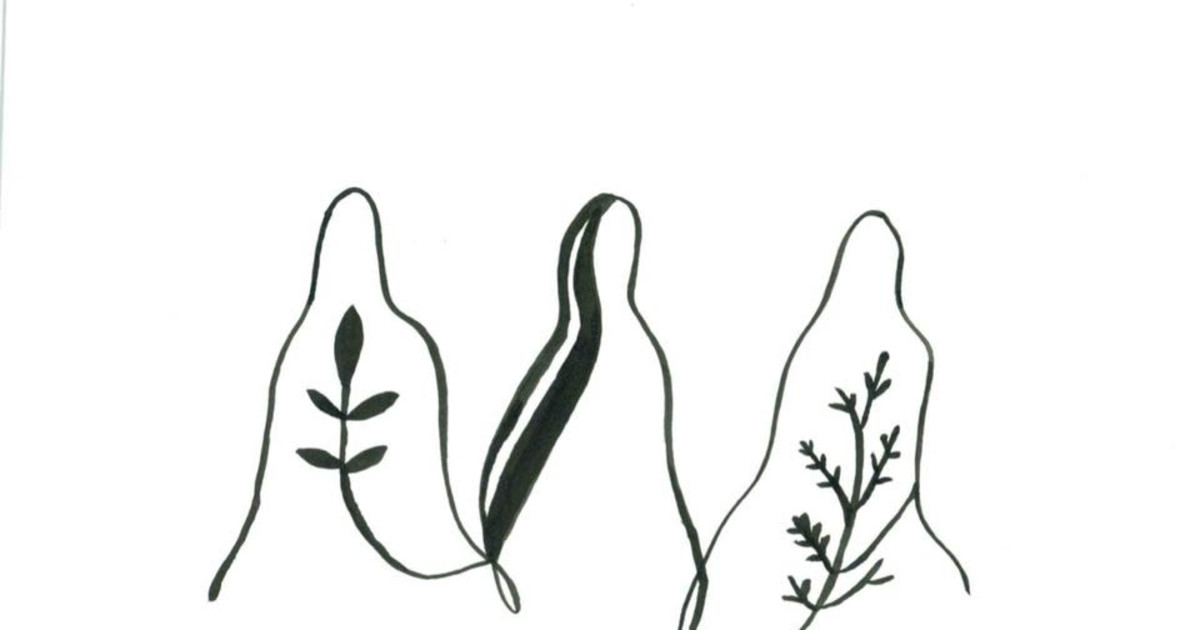instagram @art.ecosystem @indigenousbrilliance

Check out the Indigenous Brilliance Podcast here, and listen to Season 2 Episode 1: Love As Rest
The Indigenous Brilliance Collective and Art Ecosystem have come together to create season two of the Indigenous Brilliance Podcast (2022)!
In episode one “Love As Rest”, co-hosts Karmella and Lexi chat about intentional rest as a form of resistance and a necessary practice in sustainable growth and meaningful revolutionary change making.
For the month of February (Black histories and futurisms month), we are intentionally prioritizing rest as an act of self love, collective love and community. We hope this episode serves as an invitation for all Black folks to lean into a deepened sense of rest this month. And for all those participating in decolonial movement work to find deep rest and rejuvenation to allow you to continue doing your amazing and beautiful work.
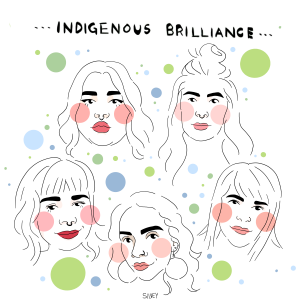
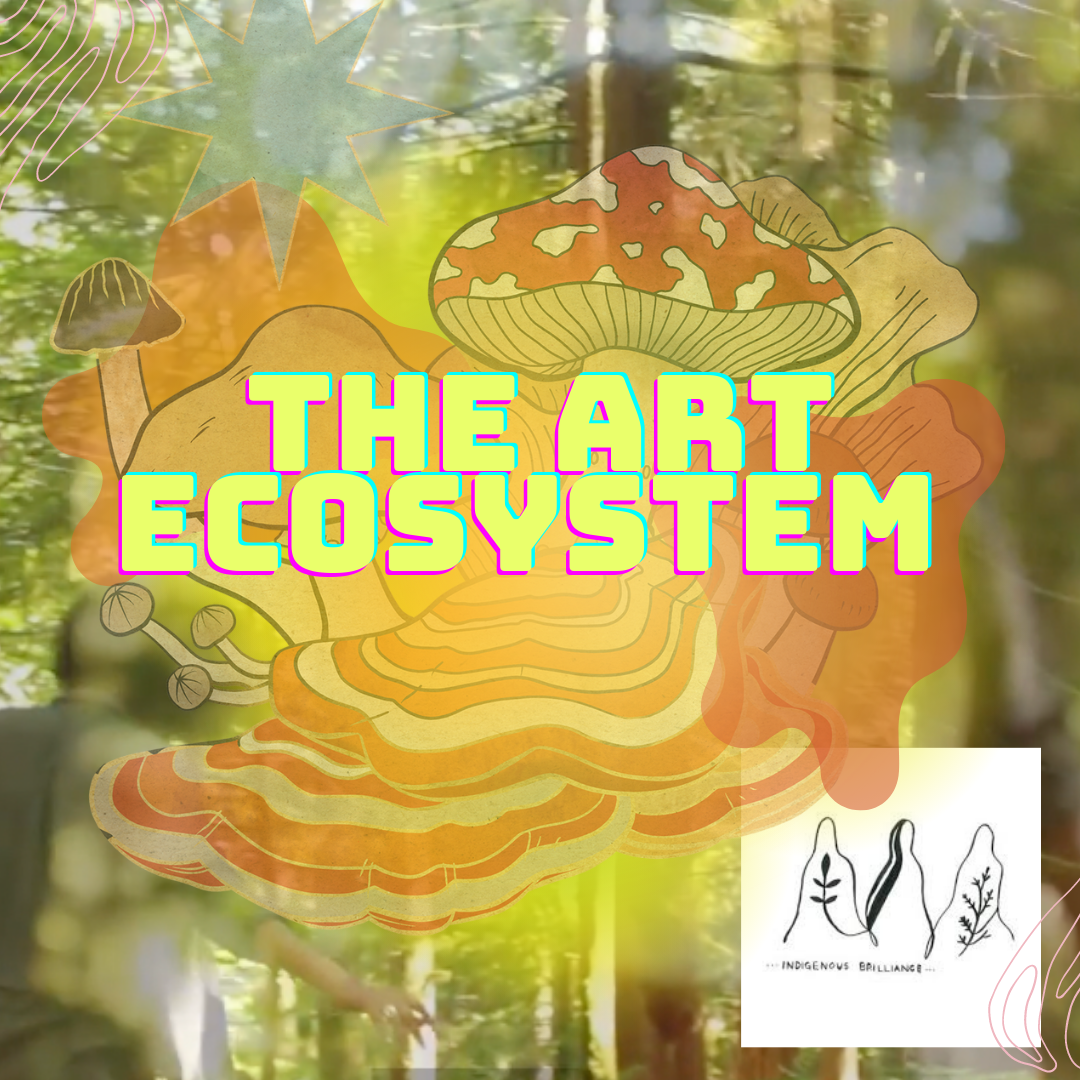
Check out season 2 episode 1 below! It will also be available on spotify and soundcloud launching February 11th, 2022. Transcription below. Music by @Edzi’u
About your hosts:
Lexi Mellish Mingo is a multi-disciplinary artist living and creating on the unceded and unsurrendered territories of the Tsleil-Waututh, Squamish, and Musqueam Nations. Descending from both Afro-Guyanese, English and Scottish ancestry, her work is inspired by the complexity of diasporic experiences, and the process of place making, through community collaboration and dialogue.
Karmella Benedito De Barros is an inner-city Indigiqueer with Mistawasis Treaty 6 and Afro-Brazilian ancestry. They are a Multidisciplinary Artist and Community Worker born and raised in diaspora as a guest on the unceded Squamish, Tsleil-Waututh, and Musqueam territories. Karmella currently co-leads the BIPOC Art Ecosystem project, and is the Indigenous Brilliance Community Engagement leader. They also support Earthseed: a Parable of the Sower Book Club with the Lucid Arts Collective.
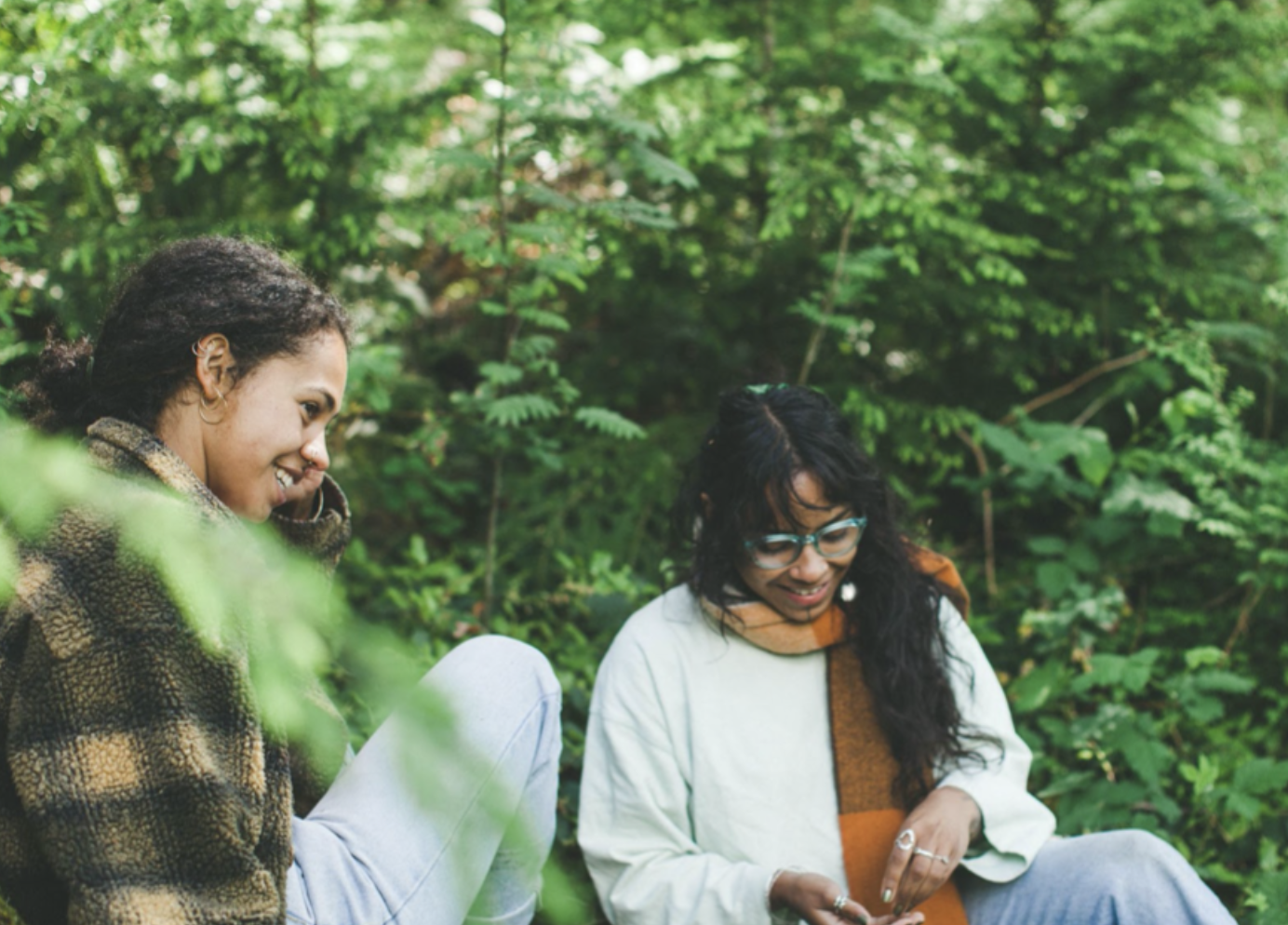




Events to check out for Black History and Futures Month:
BC General Events List https://bcblackhistory.ca/events/
Sankofa Exhibit at UBC MOA (Nov 4th – March 22nd) https://moa.ubc.ca/exhibition/sankofa/
Skin Colour In Indian Country (Feb 22nd 7:30EST) https://www.moskehtuconsulting.com/events
Black History Month at VIFF
https://www.viff.org/Online/default.asp?BOparam::WScontent::loadArticle::permalink=fc11119-the-sleeping-negro
https://www.viff.org/Online/default.asp?BOparam::WScontent::loadArticle::permalink=fc11118-lingui-the-sacred-bonds
Featured podcast recommendations:
Seat at the table https://www.cbc.ca/listen/cbc-podcasts/160-seat-at-the-table
For the wild https://forthewild.world/listen/tricia-hersey-on-rest-as-resistance-encore-267
Seen the podcast https://www.seenthepodcast.com/
Room Magazine Black History Month 2021
https://roommagazine.com/black-history-month-afro-indigenous-reading-and-media-reference-list/
https://roommagazine.com/black-history-month-on-the-room-blog/
https://roommagazine.com/black-history-month-our-favourite-canadian-writers/
Mentioned in the episode:
Kat Lee @empoweredcuriousity https://www.instagram.com/p/CYhrwB3vpJu/
Poem “Not Busy, Focused, Not Busy, Full” Adrianne Marie Brown https://adriennemareebrown.net/2021/10/26/not-busy-focused-not-busy-full/
All About Love – Bell Hooks https://storestock.massybooks.com/item/2QHtVTCGJR-y-vmDK_S93w
The Nap Ministry – Tricia Hersey https://thenapministry.wordpress.com/
Nic Wayara https://www.hookorcrookco.com/
Dora Kamu – Black Femme Meditation https://www.dorakamau.ca/
Desiree Dawson https://www.desireedawsonmusic.com/
Redistribute your wealth:
Vancouver Black Library https://www.vancouverblacklibrary.org/vision @vanblacklibrary
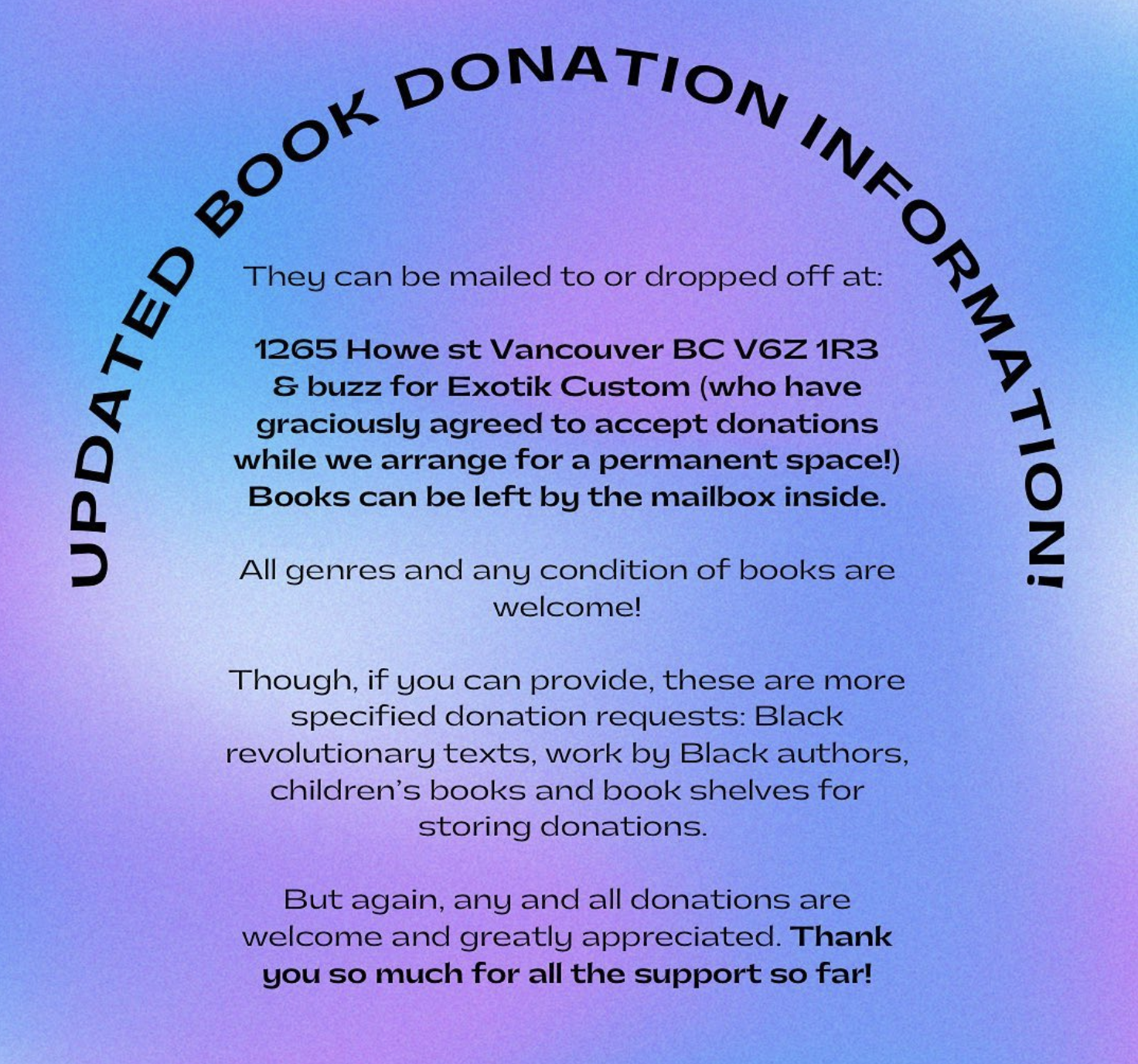
Black Arts Vancouver https://blackartsvancouver.com/ @blackartsvancouver
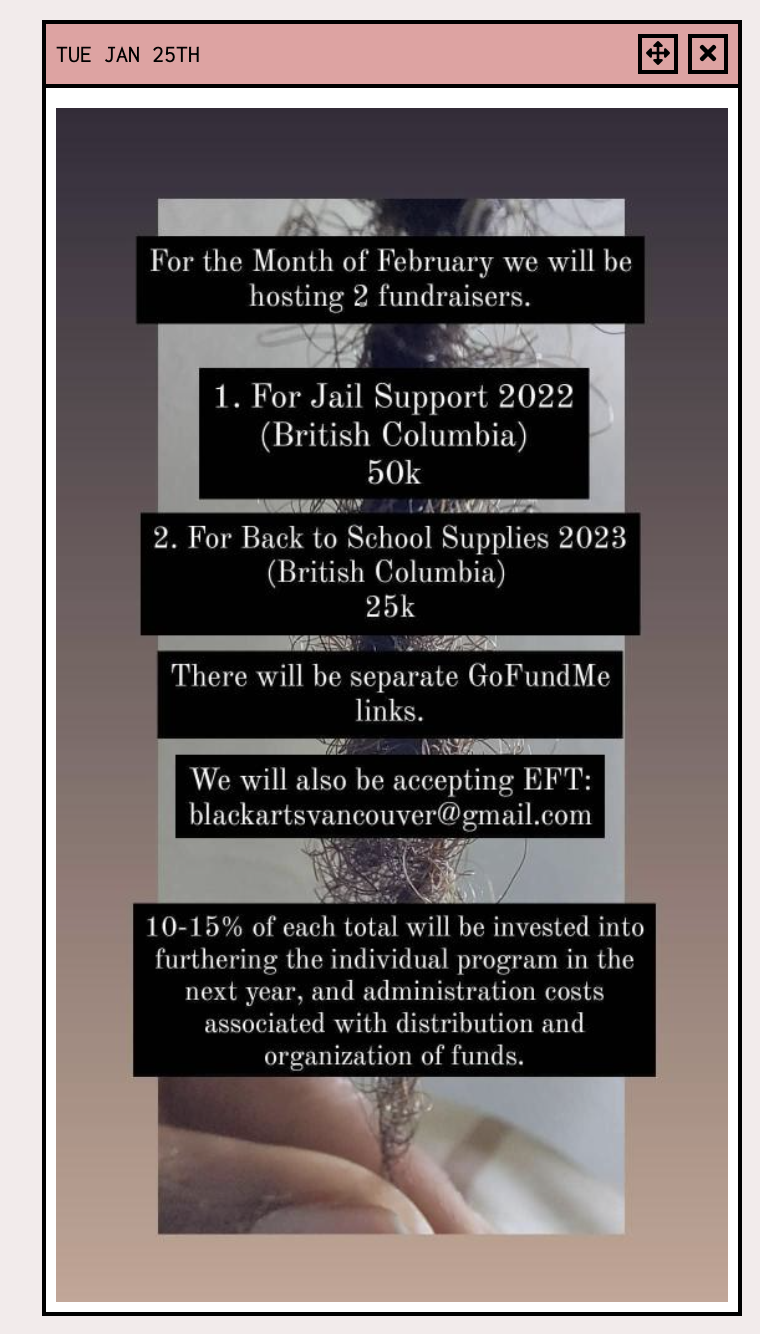
Check out season 2 episode 1! It will also be available on spotify launching February 11th, 2022. Transcription below. Music by @Edzi’u
(Intro music by Edzi’u)
Season 2 Episode 1 transcription: by Lexi Mellish-Mingo
Karmella
Hello, Tansi, Hi everyone welcome back to the Indigenous Brilliance Podcast for season 2. I’m here today, it’s Karmella with co-host, Lexi Mellish-Mingo. The Indigenous Brilliance collective and the art ecosystem have come together this year to create season two of the Indigenous Brilliance Podcast. This podcast will feature chats about community care and mobilization, rest as resistance, growing connections in cyberspace, surviving and thriving during a global pandemic, and much more. This podcast series centres Black and Indigenous solidarity building, intersectional learning and decolonizing the arts and literature scene on Musqueam, Squamish and Tsleil-Waututh unceded First Nations territories, colonially known as Vancouver.
So today, we have Lexi here, part of the art ecosystem. Lexi, do you want to introduce yourself to our listeners?
Lexi
Yea, for sure! So, hello everyone, My name is Lexi Mellish-Mingo, I use she/they pronouns and I am currently residing on the Tsleil-Waututh, Squamish and Musqueam Nation territories, so, yea, I am a mixed media artist, and I also work with Karmella on the BIPOC art ecosystem or the art ecosystem, and I’m really grateful to be able to talk to Karmella here today about something we both really value, which is rest, and leading through love. So yea, thanks Karmella.
Karmella
Ofcourse. Yea, so today, as Lexi said, we’re going to be talking about love as rest, and leading our work with love as rest especially during february, Black history Month. We want to be talking about prioritising rest and using self love and love for ourselves and community as a way to kind of pave the way for better futures for ourselves and our people. So, Love as rest is the title for this episode. It’s a topic that grew out of many conversations between the two of us, specifically regarding Black History Month and the pressure that a lot of us feel as Black people to produce and educate, and just be doing the most during february. So within the art ecosystem and Indigenous Brilliance and the work we do together, we really want to prioritize and centre rest in our work and we wanted to share a little bit about that today, share some of our thoughts, share some of our inspiration, share some quotes from some books and poets and authors that we really love, and just really uplift and celebrate Black joy and Black rest and Black futures this month, as well as, I think, for all people, just really wanting to encourage everyone to ground themselves in rest and love this month and every month.
So yea, Do we want to start with sharing a few quotes? Do you have any quotes you want to share?
Lexi
Yea, I guess on the theme of just, the community work and love, one of Tricia Hersey’s quotes is “Exhaustion will not create liberation, which I feel like, for myself, reminds me that when I’m trying my hardest to fight, or be a part of grand change, I can’t be doing it from a place of exhaustion. I find that just kind of important.
Karmella
Yea, The Nap Ministry has definitely been a huge inspiration, I think in our work and in our conversations, and in our daily lives over the past few years.
Do you mind sharing a little bit about Tricia Hersey and The Nap Ministry?
Lexi
Yea, So The Nap Ministry, I believe, originated in, was it Atlanta Georgia? I think. I’m not positive where it originated out of. I think Tricia Hersey was a student at the time and did a performance art piece where she napped in public, I think. And then it became like a public napping, like a napping in community, kind of thing and that’s pretty much what I know of how it originated. And yea, I still follow Tricia Hersey, I think you sent me a podcast in early 2020 about Tricia Hersey, so I was introduced to her and her project through you. And I still follow but I definitely appreciate how Tricia doesn’t post super often, because you know, she’s practicing what she’s preaching and resting, so those are good boundaries, and definitely a part of our work.
Karmella
Yea, and especially for Black and Native people, we’ve historically been stereotyped as being lazy, or slow or only valued as workers and for what we can produce, and so, I think rest is a really beautiful act of resistance and reclamation that is very liberating to choose to practice on a daily basis and to celebrate.
Lexi
Yea, that makes me even think about the word resistance and how for many of us Black, Indigenous, marginalized and displaced people, resistance is felt when we rest often, because we’ve been so affected by grind culture, and it feels like resting alone, you can experience resistance in itself, like you were talking about, which is a lot of work to undo. So, to get to that place where you can rest, can take a lot of rest, a lot of intentional undoing. It’s not always easy. So, I think that being gentle with yourself as you’re trying to, you know, prioritize your own rest and well being is super important.
Karmella
Totally, and it’s interesting, at least for myself, I think i’ve internalized this grind culture and capitalism and colonialism so much, that when I am resting, there quite often is a sense of guilt or this voice in my head saying “You should be doing more,” or like “Did you earn this rest?” or I’m often really nervous about being perceived as these stereotypes of like, lazy, ignorant and slow, and if I’m not working, producing or contributing to society, then I’m valueless and worthless. That undoing is really really important for us, not only for ourselves but to be modeling to our communities and to younger people, so they’re not internalizing on the same level that we have.
Lexi
“It’s an everyday practice, and I think that’s something I’ve had to do lately, is to say no to things when I’m not well and rested. This is so new to me, and it’s taken so much work to do that, and knowing that my relationships that are strong, and that have stuck with me, are the ones that I’m able to say “no” to, and the ones where I feel comfortable. So yea, having a community that can accept where you’re at, and where you can offer that same compassion, is super important and also a product of being rested and being in a community of rested people.”
(music transition)
Karmella
Yea, another quote that comes to mind for me is by Kat Lee, who, on instagram is @empoweredcuriosity and they say, “We cannot hustle our way to consciousness,” and then they go on to say, they’re talking about plants and this metaphor of plants taking energy from the sun, drinking in water and absorbing minerals and nutrients from the soil during the day and their doing all this work, but they don’t actually grow that much in the day and the biggest growth for plants actually happens at night and they’re saying the human body is no different than that. So like, in the moments when we’re not doing the most and we’re actually resting, and still, those are the moments where we’re able to integrate all of the stimulation and all of the knowledge that we’re taking in throughout the day. That’s when our bodies are really able to learn and grow and I thought that was really beautiful.
Lexi
Yea, wow, I think I needed to hear that. I didn’t know that plants grow the most at night, but it makes so much sense, and all these examples of biomimicry, how we can look at plants and animals, and natural cycles and learn from them has always felt so right for me. Yea, I definitely feel like this is really good guidance, thank you for sharing that.
Karmella
Yea, of course. Did you want to share anything from bell hooks. I know you were talking a bit about All About Love, bell hooks inspiring the Love is rest?
Lexi
Yea, I think for myself, the All About Love book kind of came back to having, well, I used to say a lot, “I want to lead with love,” and that was when I was reading bell hooks, all about love. Like, having this heart space take me where I want to go, and obviously that’s not easy all the time, we live in a world, a society that’s not premised on like, love in all of our relationships, but very much focused on romantic love, and that’s a big part of what bell hooks talks about in All About Love, but obviously there’s so much more in this book. Yea, I did have some quotes from All about Love and, it’s just like, building a relationship with love and kind of, undoing this perception of love as just romantic or how it’s perceived in the media. So, one of the quotes I have by bell hooks is: “But many of us seek community solely to escape the fear of being alone. Knowing how to be solitary is central to the art of loving. When we can be alone, we can be with others without using them as a means of escape.” bell hooks, All About Love. So yea, that kind of reminds me that having that relationship with yourself and with resting and being with yourself can help you build relationships in your community and with others. Yea, a lot of good wisdom there.
Karmella
Yea, that’s really beautiful. And that actually kind of reminds me of a question you had for this episode, which was, “What are some unconventional ways you find rest?” When I was thinking about that question and trying to answer it was kind of interesting because I was thinking about all of these conventional ways of resting. I think we typically tend to think of rest as something we do alone or something we do when we’re sleeping or we do when we’re doing “hashtag selfcare” but there’s actually so many ways that i’ve learned recently to find rest, I guess like, connecting with other people who are also prioritizing rest in a similar way, or through doing creative actions that are still filling my cup. I kind of came to this idea of active rest versus passive rest, and wanting to kind of challenge the way we talk about rest, rather than, I guess, uplifting this narrative that rest is a passive thing. We can also actively participate in rest throughout our days. So I was thinking of things like making playlists or organizing photos, or putting together a fun outfit or writing a song. Like, those are all actions that actually recharge me and I consider them to be restful. Yea, and I was wondering if you have any unconventional ways of finding rest for yourself?
Lexi
Yea definitely. Oh, I really love the idea of making a playlist as restful. I did that the other day while working and I’ve just been trying to bring in moments of rest. If it’s ten minutes every hour or two hours. Whether it’s practicing the bass or stretching or meditating between work, 10 minutes here and there, I’ve been finding that really helpful. Little chunks of rest, that are, like we said, intentional. Another big one for me is going on a walk, and not bringing my wallet, and not bringing my phone, and just be doing a walk. You don’t have to be going anywhere and you’re not going on a mission. I’ve been struggling a lot with not going into places to go shopping lately just because I know that this loneliness that we experience especially during covid and in isolation, it’s like, capitalism still exists in all of this and one of the only ways to interact with people is through going into the shops and buying something, but rather than doing that, I’ve been trying to push myself to go out and experience life, whatever that looks like. So, walks have been really, really lovely.
Karmella
Totally, Yea I feel that. I’ve been walking a lot more these days. And it feels good on the body but it also feels good to just be around people, and to see people, and to feel connected to something, even if it’s just in passing.
Lexi
Yea, absolutely. And see cute dogs and plants that might be sprouting. There’s these little flowers, snow-somethings, that are sprouting right now.
Karmella
Yea, Snow drops I think?
Lexi
Yea.
Karmella
Yea, they’re so precious. Spring is on it’s way.
So another question that I had was more about community building and community care, I guess, kind of stemming off of the direction that we’re already going. When we talk about sustainability in movement work, I think about rest as a necessity to creating and building better futures for ourselves, for the land and for all of our people, and I’m wondering what are some ways that you see folks taking space to rest while staying committed and connected to the cause, or whatever they’re fighting for. There are so many really inspiring and badass friends, community members and people around us doing so much, and I wanna celebrate that. I also wanna celebrate the ways we see those people caring for themselves and taking rest.
Lexi
Yea I think a big one lately is a lot of folks being like “I’m going on a social media hiatus, or break and I’ll be back, or I won’t” but setting those boundaries with cyberspace and social media has been big. Especially when it’s one of your primary means of connecting. It gives you an opportunity to connect back with yourself through your own eyes, and when I see someone doing that, especially when someone might be, not necessarily an influencer, but in our communities, has a big social presence, online, it’s really empowering. I’ve been doing it, you’ve been doing it, just deleting instagram for a couple days, it’s refreshing. So that’s one way. And just when people in our communities can say no to something. I think saying “no” or offering yourself time to think about something that you may or may not want to do and actually process it. When I see people do that, I’m inspired. Even though, sometimes you might have a plan with a friend and they might cancel, because they need more rest, it’s always from a good place and it’s always accepted, even if you’re a little bit bummed that you won’t be able to hangout with them, it’s out of a place of compassion as well. We all definitely need rest in these times, we’re all grieving and processing so much.
(music transition)
Karmella
Yea, on the topic of bringing other people in, I know you were talking about our work really being grounded in creating opportunities for more folks to, join in on the work that we’re doing and to feel empowered to start their own things in the arts and in the literature scene, and within all of our communities, I was wondering if you have any people who inspire you to rest, and specifically for this month, any Black folks that we want to uplift.
Lexi
Yea, I think there’s like three folks that come up for me right now, and throughout the pandemic, who have inspired me to rest more. The Scene podcast, especially through setting boundaries and prioritizing rest. So Nic, thank you for always leading by example and showing us the process of, you know, prioritizing yourself. It’s always helpful for me personally. Also, we got to do a really lovely workshop this year with Desiree Dawson, all of her work and her music, it feels like it’s really backed by a practice of rest and care. And so, that’s super inspiring for me, and I’m stoked, I hope we get to do more work with her in the future. And lastly, Dora Kamau, the meditations on youtube have got me through a lot. Big shout out there. I’ve never met them in person, but their cyber presence has been really beneficial to my wellbeing, so thanks Dora! Yea, those are some people for me. How about you?
Karmella
That’s awesome. Yea, It’s funny, I also wrote down three people, and two out of three of them were the same as yours and one of them, I’m like, how could I forget this person. But yea, I wrote down Nic Wayara, who does hook or crook consulting, and then the scene podcast as well. Last year, I got to interview Nic for a Black History Month, series of posts on the room magazine website that we can link in the podcast description and in that interview, Nic was one of the first people to suggest to me that Black History Month should be a month of rest for Black people and that we shouldn’t feel any pressure to share knowledge, educate or produce anything during this very specific month and that we should if we feel inclined to, prioritize our rest and celebrating our joy during the month rather than feeling like it’s the one month of the year that we need to get people to pay attention to our value and our worth and our struggle. So that was really impactful for me. I really appreciate Nic for saying that. And that’s inspired the way that we’re working this year and the way that we’re taking time for ourselves during the month of february, to not be doing the most, because we did a lot last year. Yea, and I also wrote down Dora Kamau, You sent me one of their meditations, and then the same week, my therapist sent me one of their meditations, so I was like “okay, okay I gotta try this.” And yea, they’re a mindfulness meditation artist, is how they describe what they do, and I think that’s really beautiful. It’s really important work, and it’s so dope to see a Black woman take leadership and creativity in that scene and in one that’s really been white washed and capitalized and i don’t know, I don’t see myself in it very often, so it’s really nice to see the work that they’re doing. And lastly, I wrote adrienne maree brown, who is an author and a poet and just an overall badass movement leader, who I know we are both kind of obsessed with. And specifically one of their poems, I wanted to read a little quote from it, and I’ll link it in the podcast description, but it’s called: “not busy, focused, not busy, full” And it’s a poem on boundaries and prioritizing the self, and rest as an act of love, which is exactly what we’re talking about today, so I’ll just read a little of it.
(transition music)
not busy, focused; not busy full
Poem by adrienne maree brown
I hope to never be busy again
I owe this quiet breath to my grandmother
I am creating at an astounding rate
and some of it I even write down
some moments I get so still
I can sense how it is all connected
and that the tissue is love
and I know my love could never be wasted
or too small a contribution
I say yes when love leads
I say yes when there’s enough time to do it well
and sometimes even then I am not there
because life showed me another way to love
and it was irresistible
(transition music)
Karmella
Yea, the whole poem, when I read it for the first time I was like “Damn, she’s onto something again.” like she’s always articulating something that we all kno, but forget. And in this way, in such a poetic and beautiful form, she’s just reminding us, say yes when you can, say yes when it feels good, and even sometimes then, we’re still going to have to say no and that’s okay.
Lexi
Yea, no, that’s real. Like, you can want to do something and just know that it’s not going to be regenerative for you.
Karmella
Yea, right. And the line: “I owe this quiet breath to my grandmother,” I think that is so beautiful and it reminds me of who we’re doing this work for, it’s not only ourselves but its intergenerational healing work, as any marginalized people, as any displaced people, as most people under capitalism, and in white-settler colonial society. We have so much healing to do for ourselves and for our ancestors and I think rest is such a beautiful thing we can offer ourselves and that we can celebrate as something that we are actually able to do.
Lexi
Yea, that reminds me, I did hear adrienne maree brown in a podcast talking a little bit about all the liberation work that has happened before us, we need to celebrate it, we need to sit in it. It kind of reminds me of that quote by Maya Angelou who says “You have your crown, now wear it.” or something like that. I actually don’t know exactly how it goes, but it’s something along those lines. And it just feels like we really need to sit into those places of rest that wouldn’t have been accessible to us 10, 15, 20, 30 years ago, more, centuries. A lot of work has had to happen in order to be here and it’s not done yet. Now it’s time to rest and lead from that place.
Karmella
Are you planning on doing anything to celebrate yourself, Black history and Black futures for the month of february and throughout the year?
Lexi
Hmm.. yea, I feel like, I don’t know. The biggest thing for me right now is trying to make space to celebrate with my friends, like you, and others. And yea, actually celebrate. You and I work together, and a lot of other friends, I don’t see in person, but like even video calls. Just like more of that, not just being together because we have a meeting or to plan an event, but to actually like, laugh, and do the good stuff, yea definitely slow down. I know we both have an intention to take it easy and not really prioritize, you know, what we produce but rather how we spend that time.
Karmella
Yea, I feel that. I think similar to me, I think I’m just trying to take it easy. There’s so much I want to learn, and so much I want to do and so many ways that I want to grow but I think I’m learning to trust that it all happens regardless as to how hard I’m working. My goal for this year is to try less, and see how that goes. I think that just existing and resting and grounding, and listening to intuition more, I think that’s going to lead me to a lot of places where I will be learning about Black History. And I’ll be able to come to a place where I’ll have the capacity to imagine futures for myself and for all of us, because I think I’m coming from a place of burn out from the last year. I’ve been having a hard time. Most of us have been having a hard time and I think when we push through that so hard and don’t give ourselves the opportunity to just breathe and have a break, it’s impossible to imagine futures. It’s impossible to imagine anything outside of what we’re currently experiencing. So I think for the month of February and I think for the rest of the year I just want to keep coming back to a place of nothing, like I just want to chill, and that’s enough. And from that place, so much will happen, regardless.
Lexi
Yea, absolutely. I made a vision board when I was just frustrated with life and I’ll show you it. One of the things it says is: No goals, but rather building a foundation. So like, we’re not trying to go anywhere right now, we’re just trying to make it feel like a safe space, to create if you wish, but no goals. I don’t have to finish anything or whatever, just like, try and find a place that feels safe and feels good.
(music transition)
Karmella
Yea, that’s dope. No goals 2022.
Lexi
Exactly
Karmella
Yea. That’s awesome. And I hope that for non-Black people, the month of February, I hope that we all continue to find rest and grounding and a sense of safety and peace and connection. But I hope that this month and the rest of the year, we also continue to celebrate, and uplift and protect Black people, and to respect and acknowledge Black history, and to honor and create a space for Black futures, because there’s a lot of work to do. And to all of our Black kin, I hope that we find so much rest, so much joy, and capacity for envisioning bigger and better futures for ourselves and all people, because we’ve been doing it, we’ve been doing the work and we will keep doing the work, but I hope we can continue doing it from a restful and joyful place as much as possible.
Lexi
Absolutely. Yea. I hope that folks get the chance to listen and redistribute wealth where possible, and also remember that taking care of yourself is something that goes beyond yourself it stretches into your community, and so yea, leading with a love ethic, and you know, reading your bell hooks and adrienne maree brown always helps.
Karmella
Hey, I hope you enjoyed our first episode of season two for the Indigenous Brilliance podcast. Let this be a gentle reminder to take time this month and every month to celebrate and uplift Black folks, to listen to our stories and to redistribute wealth throughout our communities, this can be monetary or through any other forms of abundance that you have access to. And in our show notes you can find links to some articles, our social media pages, other podcasts and folks to uplift. We hope you take time to check these out, and thank you for being here with us today. To all of our Black and Indigenous listeners, we hope that you find deep rest and moments of celebration and sparks for futurisms this month. We hope you hold onto these moments dearly, and that this is a place of rest and love that fuels you throughout all of your days. Hiy hiy, until next time.
